By Diplomacy Journal Lee Kap-soo
“Uzbekistan, the heart of Central Asia and a key crossroads of the Silk Road, is swiftly becoming a must-visit destination for travelers worldwide, including Korean tourists,” said Amb. Alisher Abdusalomov of Uzbekistan to South Korea.
In an exclusive interview with Diplomacy Journal, Amb. Abdusalomov said, “Boasting a rich history, breathtaking architecture, and a vibrant cultural heritage, Uzbekistan offers a distinctive blend of experiences that enchant and inspire.”
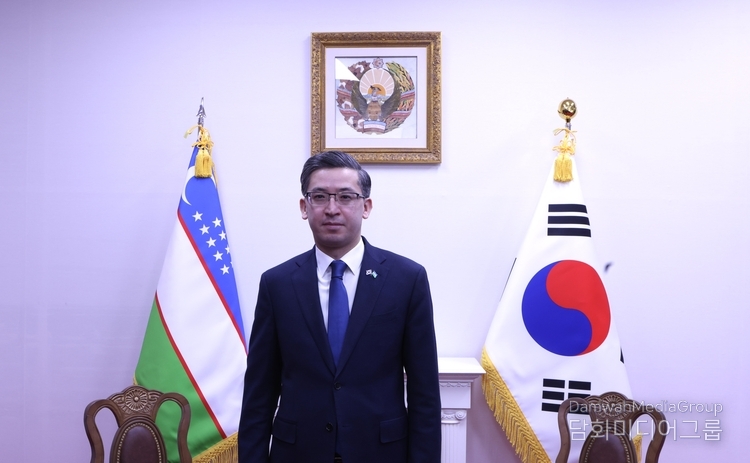
Noting that every year, Uzbekistan is visited by 40 thousand Korean tourists, he said, “Uzbekistan, a vital hub of the Great Silk Road, is home to some of the most enchanting ancient cities in Central Asia. Cities like Samarkand, Bukhara, and Khiva stand as living monuments to a storied past, showcasing a unique blend of history, art, and culture. These cities were not only bustling centers of trade but also cradles of learning and innovation during the medieval period.”
“Looking to the future,” the ambassador continued to say, “the next phase of Uzbek-South Korean relations will likely center on green technologies, digital innovation, and sustainable development. South Korea’s advanced capabilities in these areas can help Uzbekistan diversify its economy and meet its environmental challenges.
“As both countries face similar global challenges, cooperation in climate change mitigation, water conservation, and renewable energy could become key pillars of their strategic partnership.”
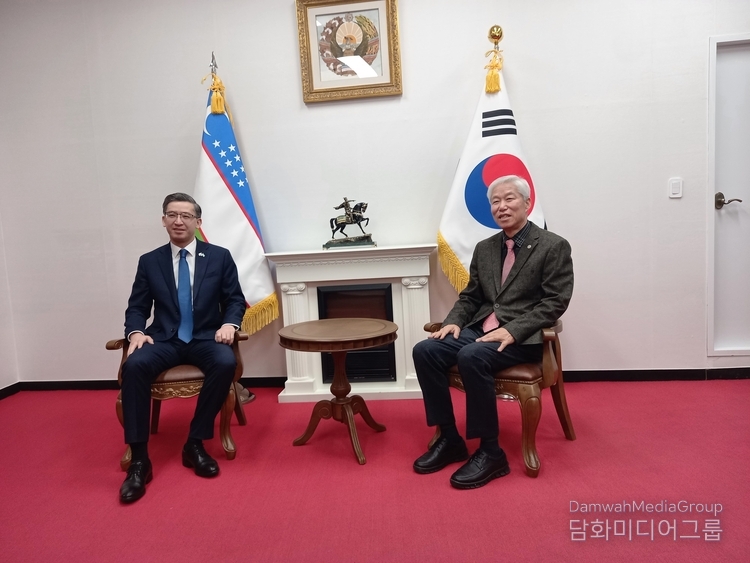
The following is the full-text of the Diplomacy Journal's interview with Amb. Alisher Abdusalomov of Uzbekistan to South Korea. -Ed.
Question: Congratulations for becoming an official ambassador of Uzbekistan to the Republic of Korea by presenting a letter of credence to Korean President Yoon Suk-yeol on Oct. 28 last year. Please introduce yourself in detail, including your career, family and hobbies.
Answer: First of all, I would like to express my heartfelt gratitude to Diplomacy Journal for the opportunity to participate in this interview.
My name is Alisher Abdusalomov, and I am the newly appointed Ambassador Extraordinary and Plenipotentiary of the Republic of Uzbekistan to the Republic of Korea. I am 40 years old and was born in the Andijan region of Uzbekistan.
After graduating from Westminster International University in Tashkent in 2006, I began my career at the Ministry of Foreign Economic Relations, Investments, and Trade of the Republic of Uzbekistan (now the Ministry of Investment, Industry, and Trade).
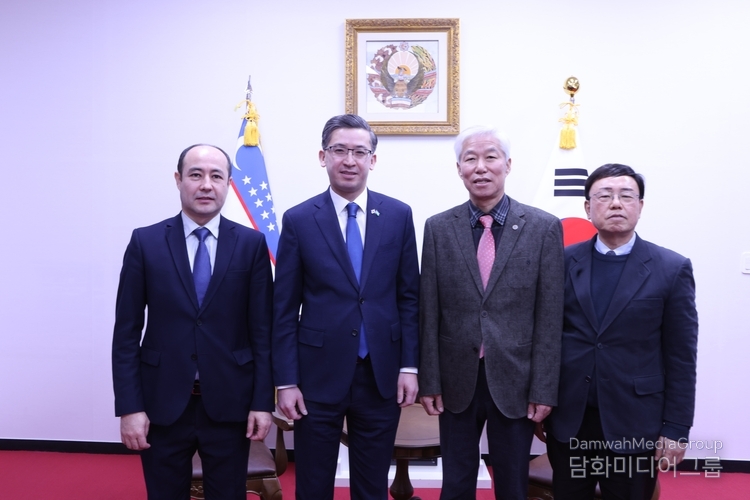
In 2010–2011, I pursued a Master’s Degree at Kyung Hee University's Global Campus in Suwon, South Korea. This was my first encounter with Korean culture and hospitality, as I participated in a KOICA program for public officials. I majored in International Trade and Economic Cooperation with a concentration in the Korean economy and development cooperation. Following my graduation, I returned to Uzbekistan to resume my work at the Ministry.
From 2013 to 2016, I served as a Counsellor on Trade and Economic Issues at the Embassy of the Republic of Uzbekistan in Japan. Upon returning to Uzbekistan, I held various positions in the Ministry of Foreign Trade from 2016 to 2018.
Between 2018 and 2024, I was posted as a Counsellor on Trade and Economic Issues at the Embassy of the Republic of Uzbekistan in the Republic of Korea. In 2024, I briefly served as Head of the Office of the Chairperson of the Senate of the Oliy Majlis of the Republic of Uzbekistan (the Upper Chamber of Parliament) from April to August.
I arrived in Seoul on August 29, 2024, in my current capacity as Ambassador, and I had the honor of presenting my Letter of Credence to His Excellency President Yoon Suk-yeol on October 28, 2024.
I am married and raising two sons (15 and 10 years old). I like to go hiking with my family.
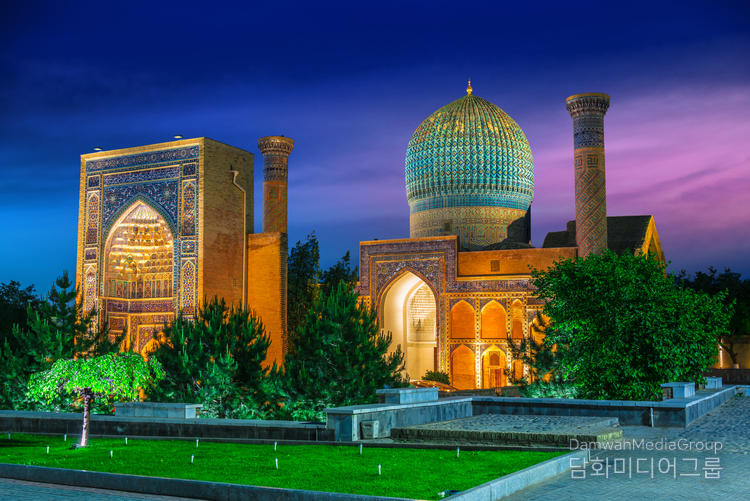
Q: Could you talk about the impact of President Yoon Suk-yeol's visit to Uzbekistan in June last year on the bilateral relations between South Korea and Uzbekistan?
A: President Yoon Suk Yeol’s visit to Uzbekistan in June 2024 significantly bolstered the bilateral relations between South Korea and Uzbekistan.
President Yoon emphasized Uzbekistan as South Korea’s “special strategic partner” in Central Asia. This visit reinforced the commitment to deepening their strategic partnership. This designation highlights the importance of Uzbekistan in South Korea’s foreign policy and underscores the commitment of Seoul to deepening its bilateral relationship with Tashkent. The strategic partnership involves collaboration in various sectors, including political, economic, and cultural exchanges. By strengthening this partnership, both countries aim to enhance their influence and cooperation in the region.
President Yoon Suk Yeol also praised Uzbekistan's socio-economic and democratic reforms under President Shavkat Mirziyoyev. Building on its own development experience, South Korea supports Uzbekistan's reform efforts and aims to collaborate closely in the social, economic, and democratic development of Uzbekistan.

The visit also underscored the strong cultural and historical connections between the two nations. It is well known that Uzbekistan is home to the largest Korean diaspora in Central Asia, known as “Goryeo-in”, with over 170,000 Koreans living there. President Yoon Suk Yeol’s visit acknowledged and celebrated these ties, reinforcing the shared heritage and mutual respect between the two nations.
President Yoon introduced the “K SILK ROAD (R.O.A.D) Cooperation Initiative”, aimed at fostering new cooperation frameworks based on over 30 years of cooperation legacy between Central Asia and Uzbekistan. This initiative focuses on joint development, convergence, and innovation. The initiative emphasizes collaboration in areas such as education, science, technology, and economic development. By leveraging Korea’s experience and expertise, the initiative seeks to create new opportunities for mutual growth and strengthen the partnership between South Korea and Uzbekistan.
These points highlight the multifaceted nature of the relationship between South Korea and Uzbekistan and the efforts to deepen their cooperation across various domains.
Overall, President Yoon Suk Yeol’s visit has set a positive trajectory for future cooperation and strengthened the already robust relationship between South Korea and Uzbekistan.
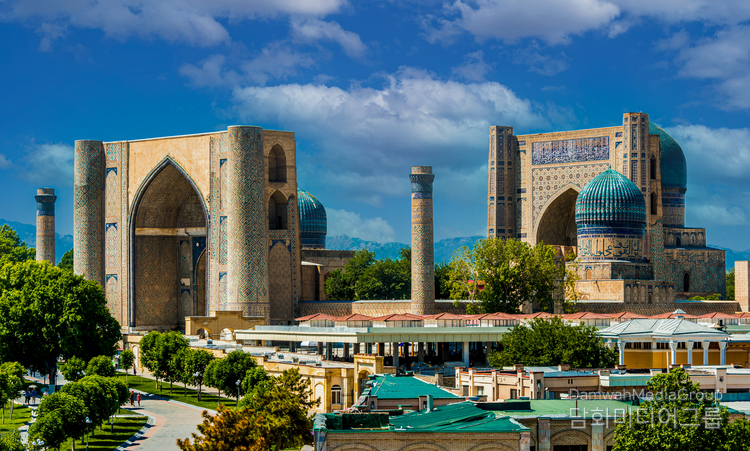
Q: Diplomatic relations between Uzbekistan and South Korea were officially formed in 1992. How has the relationship developed over the period? What do you think is the best way to further develop the relationship between Korea and Uzbekistan?
A: Since the establishment of diplomatic relations between Uzbekistan and South Korea in 1992, the bilateral ties between the two countries have experienced significant development across a wide range of areas.
Over the past three decades, this bilateral relationship has matured from initial diplomatic exchanges into a dynamic, multifaceted strategic partnership, with both countries actively working to strengthen ties in areas such as politics, economics, culture, and technology.
A key milestone in this relationship came in 2006, when the Joint Declaration on Strategic Partnership was signed, solidifying the commitment of both nations to work together in mutual interests.
However, it is during the tenure of His Excellency President Shavkat Mirziyoyev that these relations have truly reached a new level, marked by a deepening strategic partnership and a comprehensive expansion of cooperation.

Under President Mirziyoyev’s leadership, Uzbekistan has placed a strong emphasis on strengthening its foreign relations, particularly with key global partners such as South Korea. This period has witnessed a transformation in the nature of bilateral ties, transitioning from standard diplomatic relations to a robust Special Strategic Partnership. This shift was formalized in 2019, following years of consistent high-level dialogue and cooperation between the two countries. President Mirziyoyev’s proactive foreign policy approach has created a favorable environment for the two nations to pursue shared goals in political, economic, cultural, and technological spheres.
One of the key achievements in this regard has been the significant strengthening of economic ties. Under President Mirziyoyev’s leadership, Uzbekistan has become a more attractive destination for foreign investment, and South Korean businesses have played a pivotal role in this transformation. The value of trade between the two countries surpassed $2.3 billion in 2023, reflecting the deepening economic cooperation.
Additionally, South Korean investment in critical sectors such as energy, construction, textiles, and technology has grown substantially. Over 700 South Korean companies are now operating in Uzbekistan, contributing to job creation, infrastructure development, and the modernization of key industries. The opening of the first Trade House of Uzbekistan in Seoul in March 2024 will further enhance the visibility of Uzbek goods and services in the South Korean market, thus facilitating increased trade and investment.

In the realm of cultural and educational exchange, Uzbekistan has placed a strong emphasis on deepening people-to-people ties. The number of Uzbek students studying in South Korea has grown significantly, and numerous educational partnerships have been established, with more than 45 Uzbek universities cooperating with South Korean counterparts. Four South Korean universities have opened branches in Uzbekistan, further cementing the educational exchange between the two countries. These academic initiatives contribute to the long-term development of human capital in Uzbekistan, which is a priority for our country’s leadership’s modernization agenda.
Another remarkable achievement has been the expansion of scientific and technological collaboration. South Korea’s advanced expertise in fields such as biotechnology, engineering, information technology, and medicine has been invaluable in supporting Uzbekistan’s ambitious development goals. Joint research initiatives in nanotechnology and medical sciences are among the key areas where both countries have collaborated to foster innovation and knowledge transfer.
Culturally, the establishment of initiatives such as the House of Korean Culture and Art in Tashkent in 2019 and the Gratitude Monument in Seoul Park, Tashkent, are symbolic of the growing ties and mutual respect between the peoples of Uzbekistan and South Korea. The large South Korean diaspora in Uzbekistan, which exceeds 180,000 people, plays a crucial role in strengthening these cultural connections. This community has contributed significantly to the preservation and promotion of Korean traditions, language, and culture in Uzbekistan, while also fostering goodwill and understanding between the two countries.
South Korea has supported several of Uzbekistan’s initiatives at the United Nations, such as resolutions aimed at ensuring peace, stability, and sustainable development in Central Asia. In return, Uzbekistan has backed South Korean initiatives in various international forums, underlining the strength and mutual support that exists between the two countries.
Looking to the future, the next phase of Uzbek-South Korean relations will likely center on green technologies, digital innovation, and sustainable development. South Korea’s advanced capabilities in these areas can help Uzbekistan diversify its economy and meet its environmental challenges. As both countries face similar global challenges, cooperation in climate change mitigation, water conservation, and renewable energy could become key pillars of their strategic partnership.
The expansion of tourism between the two countries is another promising area. In 2023, over 35,000 South Korean tourists visited Uzbekistan, driven by growing interest in the country’s rich cultural heritage and historical sites. Direct air links between the two countries have also made travel more accessible, further encouraging people-to-people exchanges and tourism.
The bilateral ties, which have evolved from diplomatic relations into a special strategic partnership, reflect the shared vision of both countries for a future based on mutual respect, cooperation, and prosperity. Moving forward, both nations have ample opportunities to deepen their collaboration in emerging sectors such as green economy, digitalization, and sustainable development, ensuring that their relationship continues to flourish in the years ahead.
Q: Uzbekistan celebrated its 33rd anniversary since declaring September 1, 1991 as its Independence Day. Please introduce the Independence Day of Your Excellency's wonderful country.
A: On September 1, 1991, Uzbekistan declared its independence, marking a pivotal moment in its history. As we celebrate the 33rd anniversary of this monumental event, it is essential to recognize that gaining independence is not just about statehood; it’s about the aspirations, dreams, and destinies of the people. For Uzbekistan, independence has brought peace, stability, interethnic harmony, and a growing sense of national pride, and these values continue to shape the future of our nation.
The anniversary last year is celebrated under the slogan, "Only united — are we one people, only together — we are a strong country!" This reflects the spirit of national unity and collective effort, which is at the core of the successes achieved over the past three decades. Independence has allowed Uzbekistan to focus on creating a society where peaceful coexistence, religious tolerance, and intercultural dialogue are prioritized. Today, Uzbekistan is recognized for its efforts in fostering civic harmony and promoting the inclusion of diverse cultures and faiths in everyday life. These values have become integral to the development of the New Uzbekistan, ensuring that every citizen has an equal opportunity to contribute to the country’s progress.
Since independence, Uzbekistan has undergone significant changes in all areas of life, including political, economic, and social development. The country has achieved impressive economic growth, with modern technologies driving diversification and job creation. Large-scale infrastructure projects are transforming the country’s landscape, from the development of residential buildings, roads, and bridges to the construction of schools, hospitals, and cultural institutions. Major cities such as Tashkent, Samarkand, Bukhara, Khiva, and Shakhrisabz are now known worldwide for their rich architectural heritage, rooted in the golden age of the Silk Road. These cities, once the centers of science and culture, are now part of Uzbekistan’s drive to be a global hub of innovation and progress.
One of the key goals of our country is to ensure a better quality of life for all citizens. Uzbekistan is focusing on improving the standard of living through sustainable development, creating more job opportunities, and enhancing public services. Additionally, significant strides have been made in improving women’s rights, advancing gender equality, and promoting the active participation of youth in shaping the future of the nation. The year 2024 has been declared the "Year of Youth and Business Support", reflecting the government's commitment to empowering the younger generation through education, innovation, and entrepreneurship.
The 33rd anniversary of independence is a testament to the resilience and hard work of the Uzbek people. We have not only overcome challenges but have also achieved remarkable progress. The celebration of this day is not just a reflection of past achievements but a reaffirmation of our collective commitment to a bright future. As Uzbekistan continues to grow and modernize, the principles of unity, peace, and progress will continue to guide the nation toward greater success and prosperity for all its citizens.
We take pride in our homeland, and as we reflect on this milestone, we look forward to a future built on the values of peace, stability, and mutual respect. The next phase of Uzbekistan's development is shaped by our shared vision and collective effort to ensure a brighter future for the next generations.
Q: What is the present volume of bilateral trade between Uzbekistan and South Korea? Do you have any idea to boost bilateral trade between the two countries in the future? In Uzbekistan, what kinds of industrial sectors are attractive to Korean investors?
A: The Republic of Korea has traditionally been among Uzbekistan's top five major trading, investment, and technological partners. A trade agreement between the Republic of Uzbekistan and the Republic of Korea, signed in 1992, established a most-favored-nation regime in mutual trade.
Over the past six years, mutual trade has doubled, reaching $2.5 billion last year, including $40 million in Uzbek exports to Korea.
The main export items from Uzbekistan include transportation, information-telecommunication, tourism, and other business services, oil and oil products derived from bituminous minerals, wood and wood products, food products, textile products, and others.
Imports from Korea primarily consist of vehicles and spare parts, mechanical equipment, electrical equipment and components, plastic and plastic products, transportation and technical services, ferrous metals and products, optical instruments and devices, chemical products, rubber and rubber products, and more.
The governments of Uzbekistan and Korea have set a target to increase bilateral trade to $5 billion in the coming years. To achieve this, concrete measures are being taken to expand and balance mutual trade, in particular:
- In April 2020, the Korean Ministry of Trade, Industry, and Energy registered the "Korea-Uzbekistan Business Association" (KUBA), serving as a platform for enhancing economic cooperation (its office in Tashkent opened in September 2020);
- On September 12, 2023, a Framework Program for Trade and Investment Facilitation was signed in Seoul;
- In March 2024, the first Uzbek-Korean trade house was opened in Seoul;
- Negotiations are ongoing to grant import access for Uzbek grapes and melons to South Korea. A phytosanitary permit has been obtained to export 50 types of fresh (7 types in 2024), frozen, and dried agricultural products from Uzbekistan to Korea.
In recent years, the Republic of Korea has become a key partner in modernizing Uzbekistan's economy and industry. The total volume of Korean investments in Uzbekistan’s economy has exceeded $7.5 billion. Over 700 enterprises with Korean capital operate in Uzbekistan.
Today, significant projects are being implemented with leading Korean companies such as POSCO, Lotte Chemical, Samsung, KIA, Shingdong Enercom, BOMI, and many others in industries including manufacturing, energy, electronics, automotive, chemical, mining, textile, food, IT, and other critical sectors.
Successful examples include the establishment of the Ustyurt Gas Chemical Complex with a Korean consortium comprising KOGAS, Lotte Chemical, and GS E&R, a textile cluster with POSCO, the production of household appliances with Samsung, the manufacture of KIA vehicles with KIA Motors, and silicon extraction and processing with Shingdong Enercom, among others.
Thanks to the Government of the Republic of Korea, significant social projects are being implemented in Uzbekistan within the framework of the Official Development Assistance (ODA) Program. The Korean Eximbank, EDCF and KOICA are Uzbekistan’s main partners, with a portfolio of joint projects exceeding $3.3 billion.
In Uzbekistan, facilities such as a multi-disciplinary children’s clinic, vocational training centers in Samarkand, Shakhrisabz, and Fergana, the Uzbek-Korean Educational and Practical Textile Technopark, the Scientific and Technological Center for Rare Metals and Alloys, the Design and Technology Center for Agricultural Machinery, and the Uzbek-Korean E-Government Cooperation Center have been established.
Currently, the construction of Uzbek-Korean centers in construction and chemical technology, a multidisciplinary adult hospital, an oncology clinic, and a medical university are being implemented.
During the visit of President Yoon Suk Yeol to Uzbekistan in June last year, promising areas for investment cooperation with Korean companies and the creation of a favorable business environment were discussed.
In particular, an agreement was reached to form a new high-tech agenda for the Uzbek-Korean special strategic partnership for the next three years. To this end, the we will prepare a strategic program for the establishment of a regional high-technology hub in Uzbekistan. Priority areas of cooperation in the Strategy include:
- partnership in critical mineral resources, focusing on deep processing of resource bases to create a full value-added chain;
- strategic cooperation in semiconductors, where the Republic of Korea is traditionally a global leader. Plans include establishing the region’s first fully-fledged semiconductor research and production cluster in Uzbekistan;
- comprehensive partnership in the chemical industry, including new projects for producing green hydrogen and ammonia, as well as manufacturing finished rubber products;
- strengthening cooperation in mechanical engineering, including the joint production of new types of vehicles and components;
- technology transfer for creating “smart” agriculture through digitalization of the agricultural sector and the introduction of smart and green technologies;
- infrastructure modernization and urban development programs. Korean companies have expressed strong interest in modernizing transport infrastructure and designing and constructing residential and commercial facilities under public-private partnership principles.
Moreover, on a systematic basis, interregional cooperation continues to expand. As part of deepening interregional collaboration and implementing investment projects in the regions of Uzbekistan, a delegation from Yangikurgan District, Namangan Region, visited regions of the Republic of Korea from January 14–18, last year.
Similarly, from November 27–29, last year, a delegation led by the Hokim of Fergana Region, Mr. Hayrulla Bozorov, visited Chungcheongnam-do Province. During the visit, an opening ceremony was held for the Investment and Trade Representation of Fergana Region in Chungcheongnam-do Province.
Between April and November of last year, delegations from the provinces of Chungcheongbuk-do and Chungcheongnam-do, as well as the cities of Gwangju, Daegu, Buyeo, Ulsan, Andong, and Jeonju, visited various regions of Uzbekistan, including Samarkand, Fergana, Syrdarya, and Namangan regions, as well as the cities of Bukhara and Kokand.
During these visits, bilateral meetings were held between regional and city leaders, agreements were signed to expand interregional cooperation in trade, economic development, investment, cultural and humanitarian exchanges, tourism, and other areas. Additionally, business forums were organized with the participation of leading companies from both sides.
On November 26, an Uzbek delegation, including representatives from the Republic of Karakalpakstan, Tashkent, and Karshi, participated in the First Korea-Central Asia Regional Cooperation Forum organized by the Governors Association of the Republic of Korea (GAROK).
To further enhance economic cooperation and establish direct contacts between entrepreneurs and business representatives of both sides, approximately 20 business forums have been conducted in both Uzbekistan and the Republic of Korea.
Q: What tourist attractions do you want to recommend to Korean tourists? Do you have any government programs to attract foreign tourists, including Koreans, to Uzbekistan?
A: Uzbekistan, the heart of Central Asia and a key crossroads of the Silk Road, is swiftly becoming a must-visit destination for travelers worldwide, including Korean tourists. Boasting a rich history, breathtaking architecture, and a vibrant cultural heritage, Uzbekistan offers a distinctive blend of experiences that enchant and inspire. Every year, Uzbekistan is visited by 40 thousand Korean tourists.
The Ancient Cities of the Great Silk Road.
Uzbekistan, a vital hub of the Great Silk Road, is home to some of the most enchanting ancient cities in Central Asia. Cities like Samarkand, Bukhara, and Khiva stand as living monuments to a storied past, showcasing a unique blend of history, art, and culture. These cities were not only bustling centers of trade but also cradles of learning and innovation during the medieval period.
Samarkand: Known as the "Pearl of the East," Samarkand is a UNESCO World Heritage site. Highlights include the awe-inspiring Registan Square, the Shah-i-Zinda Necropolis, and the majestic Bibi-Khanym Mosque.
Bukhara: This city offers a journey through history with the Ark Fortress, the serene Lyabi-Hauz Complex, and the charming Chor-Minor Mosque.
Khiva: A living museum, Khiva’s Itchan Kala is a walled city featuring the iconic Kalta Minor Minaret and the historic Kunya Ark Fortress.
Tashkent: The capital city boasts a blend of modernity and tradition. Explore the bustling Chorsu Bazaar, the beautifully adorned Tashkent Metro, and cultural landmarks like Amir Timur Square.
The Great Silk Road, a historic network of trade routes that connected the East and West, has left an indelible mark on Uzbekistan. Visitors can walk in the footsteps of ancient merchants, exploring cities that were once bustling hubs of commerce, culture, and innovation.
Uzbekistan Government Programs to Attract Foreign Tourists:
Uzbekistan has launched various initiatives to make the country more accessible and appealing to international visitors, including Korean tourists:
- Simplified Visa Procedures: Uzbekistan offers a visa-free regime for South Korean citizens, allowing travelers to stay for up to 30 days without a visa. This initiative significantly reduces travel barriers;
- Enhanced Travel Infrastructure: The government has invested heavily in modernizing airports, railways, and roads to ensure a comfortable travel experience. High-speed trains connect major cities like Tashkent, Samarkand, and Bukhara, making travel convenient and efficient;
- Cultural Exchange Programs: Collaborative efforts between Uzbekistan and South Korea include cultural festivals, exhibitions, and events showcasing traditional Uzbek music, dance, and cuisine. These programs foster mutual appreciation and attract tourists eager to explore a shared cultural heritage;
- Digital Transformation: Uzbekistan’s tourism industry embraces technology through online platforms and mobile apps that provide information on attractions, accommodations, and guided tours in multiple languages, including Korean.
Uzbekistan is ready to offer Korean tourists an unforgettable journey through time and culture. With its historic landmarks, natural beauty, and welcoming hospitality, the country is a treasure trove of experiences waiting to be discovered. Combined with government initiatives to facilitate and enhance tourism, Uzbekistan is becoming an increasingly attractive destination for travelers from South Korea.
Embark on a journey to Uzbekistan and create memories that will last a lifetime. We look forward to welcoming all Korean tourists!







